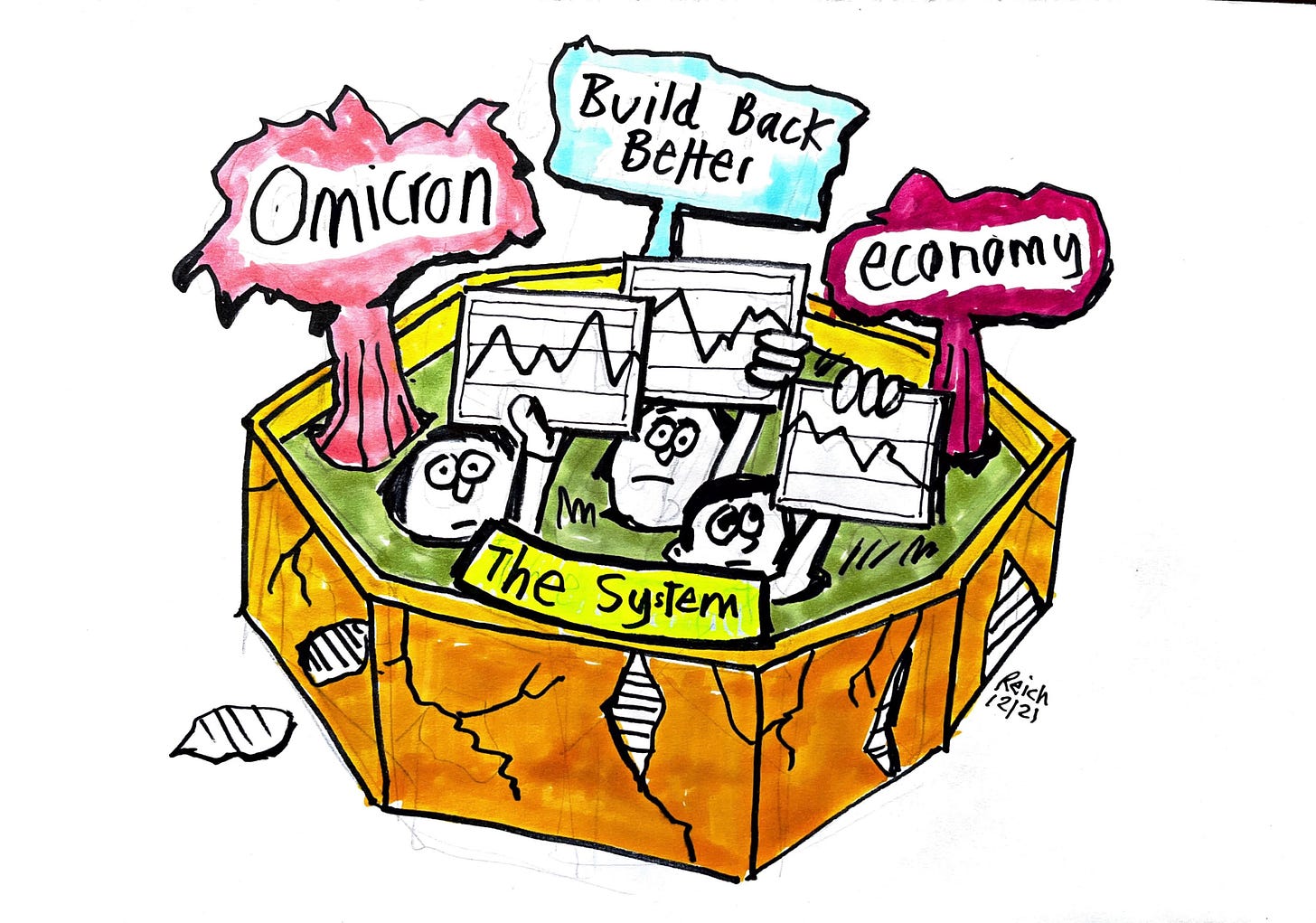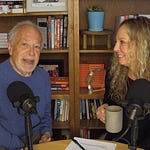Friends,
You will hear lots of reports this week about whether the economy is strengthening or weakening, whether Biden’s “Build Back Better” bill will get fifty votes in the Senate, and whether the Omicron variant of Covid will rapidly spread in the United States. What you will not hear is how closely these three questions are related to each other and to the strength of our system as a whole.
Economics, politics, and public health are often treated as separate topics -- each with its own reporters, editors, experts, and analysts. But if we have learned anything over the past 21 months of crisis, it is that these three are intimately connected. In many respects, they suggest we’re at an inflection point similar to the one we were at 21 months ago.
It is impossible to know where the economy is heading without knowing where the Omicron variant is heading, because the pandemic continues to dictate economic activity in US and around the world. Omicron is already affecting peoples’ travel plans.
It’s impossible to know where the Omicron variant is heading without assessing the strength and agility of our public health system, because that system – from the data collected by the Centers for Disease Control to the responsiveness of states public health officials and local hospitals – will determine how well we contain and survive it, and other variants to come.
It’s impossible to assess the strength of our public health system without knowing the capacity of government — including the White House, governors, and our other political institutions — to rise to whatever challenge Omicron may pose, be it getting the public fully vaccinated and tested; getting people to wear masks, quarantine, and take other necessary precautions; tracing their contacts; and creating reasonable incentives for the private sector to develop ever-better vaccines, tests, and means for reducing deaths after infection.
The capacity of government depends, in turn, on public trust in our institutions — on social solidarity, on the strength of the fabric of our society.
In other words, our wellbeing depends on the capacity of an interlocking economic, public health, and political system.
That overall system is especially weak right now because it’s riddled with distrust. Not only are we deeply split as a nation, but many of those with power and wealth have used the last 21 perilous months to siphon off whatever additional power and wealth they could from everyone else -- further eroding trust in all institutions.
American large corporations have scored record profits, but instead of lowering prices they’ve been using the specter of inflation to jack up their prices. They’re also using their profits to mount one of history’s biggest lobbing campaigns against Biden’s social and climate policies. And despite promises to the contrary, they’ve resumed funding the 8 senators and 139 representatives who refused to certify Biden’s victory. Meanwhile, billionaire monopolists have increased their wealth by over $2 trillion since February 2020 and are using some of it to fight tooth-and-nail against proposals to increase their taxes (which many have managed to keep at or near zero). Wall Street’s “too-big-to-fail” banks have been using record-low interest rates and the Fed’s indirect subsidies to return to their old gambling ways.
Health care has become even less efficient and more costly. Private-equity and hedge funds have used the last 21 months to buy up more hospitals and healthcare facilities, turning them into profit centers (or high-end condominiums). Big Pharma has been using its skyrocketing profits to lobby against allowing Medicare to reduce the prices of prescription drugs. The former director of the Centers for Disease Control accuses Pfizer and Moderna of “war profiteering’’ for refusing to share their technologies.
Republican lawmakers have eagerly accepted all corporate bribes, as have many Democratic lawmakers. At the same time, Republican politicians have cowered before Trump’s Big Lie. And rightwing political operatives, editors, broadcasters, and media personalities have used the last 21 months to get richer by exploiting Americans’ fear, uncertainty, and paranoia.
All of which have further diminished public trust and weakened the system’s capacity to achieve the common good.
The reports you’ll hear this week about the economy, Biden’s “Build Back Better” bill, and the Omicron Variant, will all be slightly beside the point because they don’t address the underlying problem: that our system has become more enfeebled over the last 21 months because it has been exploited for private gain. Which could spell trouble ahead.
Wars, depressions, and other national catastrophes sometimes strengthen a society by revealing and fortifying peoples’ common interest, and eliciting common sacrifice. That was America’s experience after the Great Depression and World War II. Yet the crisis we’ve been through since February 2020 seems to have debilitated us as a society rather than strengthened us.
As many of you know, I am a great believer in the resilience of America, and I continue to have faith in our remarkable capacity to remedy what’s wrong and emerge stronger. That is the central lesson of our history. Although the past 21 months have not been encouraging, I still feel confident that the common good will prevail. The question is how much unnecessary suffering we’ll have to endure in the meantime.
What do you think?






















The Week Ahead: A test for the American system